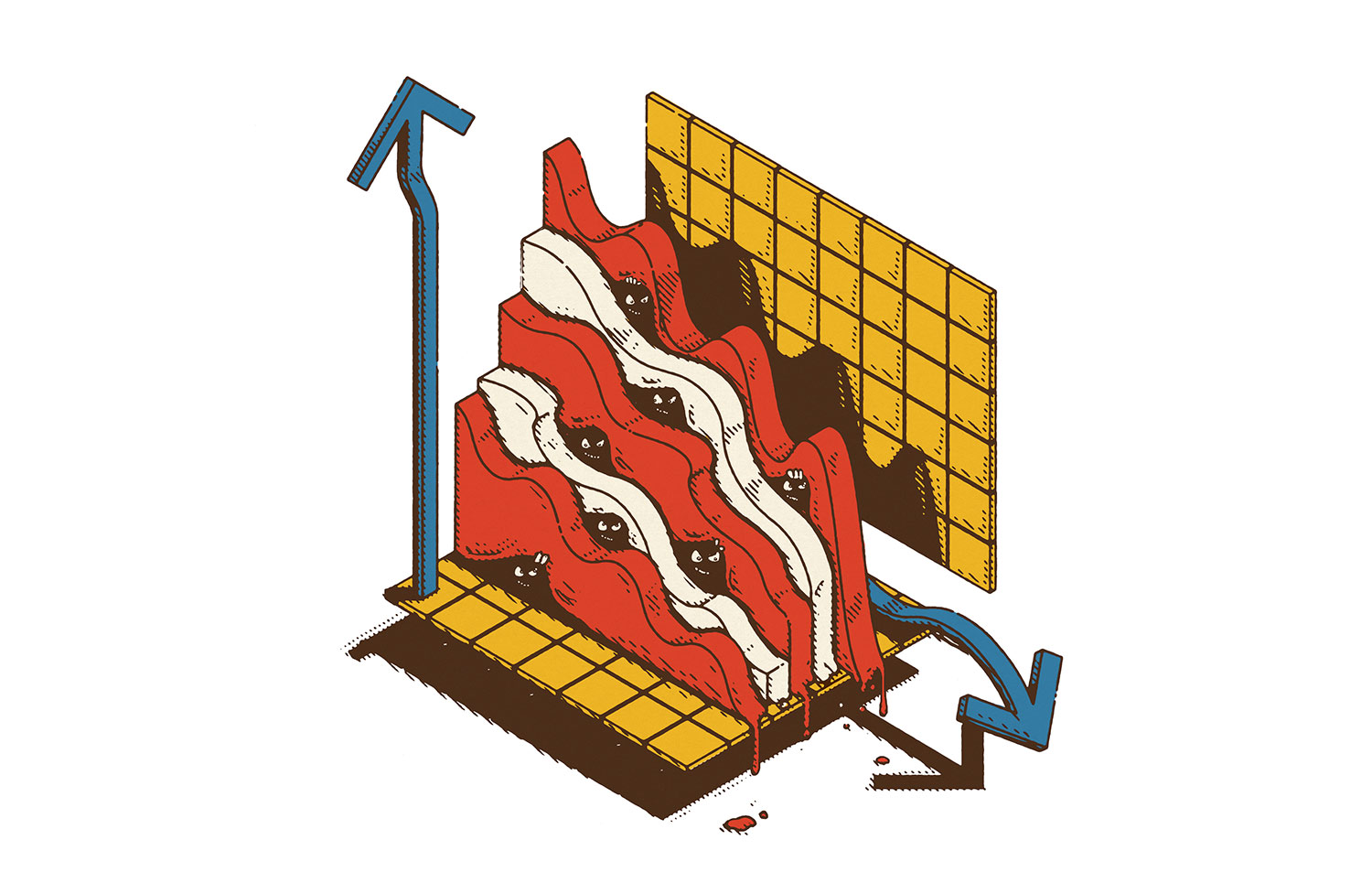
近日,多只美股受疫情冲击跳水大跌,一些激进投资者却在看准风口后伺机而动。
激进投资者相信干预的力量。基于现阶段的低位股价,他们借助金融杠杆持续加仓使自己成为企业的战略股东并进入董事会,再通过行使股东权利迫使企业管理层作出各种调整,促进企业治理改善、提升企业股价,进而更快地获得丰厚的短期回报。事实上,2007年至2008年的金融危机时期也出现过同样的风潮,但当时大部分的激进投资者直到最终也未能解套。
如今,疫情的爆发再次激起了他们的投资狂潮。截至5月13日,标普500指数的市盈率已经由1月的23.5跌至20.9。虽然从历史标准上尚不能评定其为最低点,但也足以让饥渴的“鲨鱼”型投资者们馋涎欲滴了。今年3月,就在对冲基金埃利奥特资产管理公司(Elliott Management)由于不利行情而暂缓持股推特(Twitter)之际,被称为“企业狙击手”的激进投资者卡尔·伊坎却大举加仓西方石油公司(Occidental Petroleum),将其持股比例提高至近10%,并入驻董事会。
从短期来看,激进投资者们会带动股价上升,已经持股的其他股东们也会因为这种回暖而分得一杯羹。换言之,一旦股市利空出尽、激进投资者们抄底成功,将会对多方有利。近期,美国一所高校团队的研究结果显示,那些愿意让机构投资者(共同基金和养老基金)在最大程度上介入公司治理的企业,将会更有利于激进投资者的进场。
和大多数鲨鱼一样,大多数激进投资者都是群体作战,他们需要在一家公司现有的股东中找寻志同道合的盟友,从而抱团组成“激进股东”阵营来夺取企业的治理权。
为了考察激进股东们的群体结构,近期另一项研究对2008年至2015年间在不同企业内部发生过的188个“代理权争夺”案例进行了分析。研究人员发现,在持股机构方面,类似于Vanguard、贝莱德(BlackRock)和道富银行(State Street)这样的指数基金巨头不喜欢加入激进股东的反抗队伍,原因在于随着客户向他们的市场跟踪基金注入数万亿美元资金,这些公司的股份和影响力在不断增长。但大多数激进股东都倾向于支持现有的企业管理层。
杜克大学金融学教授、该项研究的联合学者阿隆·布雷夫认为,当激进股东萌发争夺企业代理权的意愿之时,“相同意愿的股东基础显然很重要”。比起被动型的指数基金,主动型基金的目标在于超越市场业绩,更可能支持激进股东在短期内大幅提升企业股价的投资策略。
那么,纵观在疫情中惨遭股价下跌的企业,哪一家更可能成为激进投资者的重点目标呢?为了解答这个问题,《财富》杂志基于金融研究机构Active Insight所列出的“被激进股东持股最多”的公司名单,分别就他们的股票回报率、股票表现及其他因素三个方面进行了分析。随后,又进一步对那些“被主动型基金持股最多”的公司进行了分类,最终将目光锁定在了以下几家公司的身上:
PVH集团
PVH集团旗下拥有众多知名品牌,其中包括Tommy Hilfiger和Calvin Klein,这两大品牌也占了其销售额的近85%。正如蒙特利尔银行资本市场(BMO Capital Markets)的分析师西蒙·西格尔所说,该公司的最成功之处在就于其广阔的品牌兼容性。
然而,PVH的销售渠道非常单一,仅仅局限于百货公司、专卖店这一类型的实体零售业,已经不能跟上互联网时代的脚步。所以,即便是疫情爆发之前,PVH的股价已下跌了59%,加之疫情下居民急剧消减的消费热情,该公司可谓举步维艰。在激进股东看来,及时关闭部分的专卖店、撤出一些入驻在百货公司旗下的商铺是现阶段提振PVH股价的最佳手段。数据显示,PVH集团39%的股份目前正是掌握在这一类激进股东的手中,一场变革指日可待。
美国航空公司
全球范围内的大停运击垮了几乎所有的航空公司,美国航空公司(American Airlines)也未能幸免。据伯恩斯坦公司(Bernstein)的分析师大卫·弗农预计,2021年,这个曾在去年完成460亿美元营收的航空巨头,将面临超过50%的金额损失。目前,该公司的现金流正以每天7000万美元的速度灰飞烟灭。
更令人惋惜的是,就在疫情爆发前不久,美国航空刚刚欠下210亿美元用于机队大修,想必该公司现时一定追悔莫及。不过,当疫情结束以后,美国航空应该会是最开始恢复航班的公司,因为其他航空在下一阶段显然已经无力支付如此巨款来重新维修它们的飞机了。
如此严峻的现状加之过去三个月股价跌去三分之二的悲痛事实,在某些程度上很可能会吸引激进股东的注意。目前,美国航空26%的股份掌握在激进股东的手中,接下来的一段时间,该公司的董事会很可能出现一些新的面孔和新的治理声音。
诺贝尔能源、Flowserve
和其他难友一样,石油生产商诺贝尔能源(Noble Energy)、油气设备供应商Flowserve也在努力应对石油需求大幅度下行的局面。尽管这场危机不会一直持续下去,但激进股东的入场,将为这两家公司创造顺势改革、精简业务的可能。
史迪福投行(Stifel)的分析师内森·琼斯表示,在疫情爆发以前,Flowserve公司的抽运器和机械阀门就早已供过于求,该公司接下来可能会考虑削减其在欧洲地区的业务。
同样地,对于此前在美国、西非、地中海均有经营业务的诺贝尔能源而言,下一阶段可以将目光全力集中于以色列海岸这个最新的石油开采地。晨星(Morningstar)的分析师大卫·密茨表示,以色列地区低廉的的运营成本对于诺贝尔能源来说会更加有利可图。
目前,这两家公司的市值都跌至了50亿美元以下,主动型基金持股比例都超过了30%,无疑也是激进投资者拟对其公司治理方式进行改组的理想对象。(财富中文网)
本文另一版本登载于《财富》杂志2020年6/7月刊,标题为《激进投资者将大幅加仓弱势股》。
编译:陈怡轩
近日,多只美股受疫情冲击跳水大跌,一些激进投资者却在看准风口后伺机而动。
激进投资者相信干预的力量。基于现阶段的低位股价,他们借助金融杠杆持续加仓使自己成为企业的战略股东并进入董事会,再通过行使股东权利迫使企业管理层作出各种调整,促进企业治理改善、提升企业股价,进而更快地获得丰厚的短期回报。事实上,2007年至2008年的金融危机时期也出现过同样的风潮,但当时大部分的激进投资者直到最终也未能解套。
如今,疫情的爆发再次激起了他们的投资狂潮。截至5月13日,标普500指数的市盈率已经由1月的23.5跌至20.9。虽然从历史标准上尚不能评定其为最低点,但也足以让饥渴的“鲨鱼”型投资者们馋涎欲滴了。今年3月,就在对冲基金埃利奥特资产管理公司(Elliott Management)由于不利行情而暂缓持股推特(Twitter)之际,被称为“企业狙击手”的激进投资者卡尔·伊坎却大举加仓西方石油公司(Occidental Petroleum),将其持股比例提高至近10%,并入驻董事会。
从短期来看,激进投资者们会带动股价上升,已经持股的其他股东们也会因为这种回暖而分得一杯羹。换言之,一旦股市利空出尽、激进投资者们抄底成功,将会对多方有利。近期,美国一所高校团队的研究结果显示,那些愿意让机构投资者(共同基金和养老基金)在最大程度上介入公司治理的企业,将会更有利于激进投资者的进场。
和大多数鲨鱼一样,大多数激进投资者都是群体作战,他们需要在一家公司现有的股东中找寻志同道合的盟友,从而抱团组成“激进股东”阵营来夺取企业的治理权。
为了考察激进股东们的群体结构,近期另一项研究对2008年至2015年间在不同企业内部发生过的188个“代理权争夺”案例进行了分析。研究人员发现,在持股机构方面,类似于Vanguard、贝莱德(BlackRock)和道富银行(State Street)这样的指数基金巨头不喜欢加入激进股东的反抗队伍,原因在于随着客户向他们的市场跟踪基金注入数万亿美元资金,这些公司的股份和影响力在不断增长。但大多数激进股东都倾向于支持现有的企业管理层。
杜克大学金融学教授、该项研究的联合学者阿隆·布雷夫认为,当激进股东萌发争夺企业代理权的意愿之时,“相同意愿的股东基础显然很重要”。比起被动型的指数基金,主动型基金的目标在于超越市场业绩,更可能支持激进股东在短期内大幅提升企业股价的投资策略。
那么,纵观在疫情中惨遭股价下跌的企业,哪一家更可能成为激进投资者的重点目标呢?为了解答这个问题,《财富》杂志基于金融研究机构Active Insight所列出的“被激进股东持股最多”的公司名单,分别就他们的股票回报率、股票表现及其他因素三个方面进行了分析。随后,又进一步对那些“被主动型基金持股最多”的公司进行了分类,最终将目光锁定在了以下几家公司的身上:
PVH集团
PVH集团旗下拥有众多知名品牌,其中包括Tommy Hilfiger和Calvin Klein,这两大品牌也占了其销售额的近85%。正如蒙特利尔银行资本市场(BMO Capital Markets)的分析师西蒙·西格尔所说,该公司的最成功之处在就于其广阔的品牌兼容性。
然而,PVH的销售渠道非常单一,仅仅局限于百货公司、专卖店这一类型的实体零售业,已经不能跟上互联网时代的脚步。所以,即便是疫情爆发之前,PVH的股价已下跌了59%,加之疫情下居民急剧消减的消费热情,该公司可谓举步维艰。在激进股东看来,及时关闭部分的专卖店、撤出一些入驻在百货公司旗下的商铺是现阶段提振PVH股价的最佳手段。数据显示,PVH集团39%的股份目前正是掌握在这一类激进股东的手中,一场变革指日可待。
美国航空公司
全球范围内的大停运击垮了几乎所有的航空公司,美国航空公司(American Airlines)也未能幸免。据伯恩斯坦公司(Bernstein)的分析师大卫·弗农预计,2021年,这个曾在去年完成460亿美元营收的航空巨头,将面临超过50%的金额损失。目前,该公司的现金流正以每天7000万美元的速度灰飞烟灭。
更令人惋惜的是,就在疫情爆发前不久,美国航空刚刚欠下210亿美元用于机队大修,想必该公司现时一定追悔莫及。不过,当疫情结束以后,美国航空应该会是最开始恢复航班的公司,因为其他航空在下一阶段显然已经无力支付如此巨款来重新维修它们的飞机了。
如此严峻的现状加之过去三个月股价跌去三分之二的悲痛事实,在某些程度上很可能会吸引激进股东的注意。目前,美国航空26%的股份掌握在激进股东的手中,接下来的一段时间,该公司的董事会很可能出现一些新的面孔和新的治理声音。
诺贝尔能源、Flowserve
和其他难友一样,石油生产商诺贝尔能源(Noble Energy)、油气设备供应商Flowserve也在努力应对石油需求大幅度下行的局面。尽管这场危机不会一直持续下去,但激进股东的入场,将为这两家公司创造顺势改革、精简业务的可能。
史迪福投行(Stifel)的分析师内森·琼斯表示,在疫情爆发以前,Flowserve公司的抽运器和机械阀门就早已供过于求,该公司接下来可能会考虑削减其在欧洲地区的业务。
同样地,对于此前在美国、西非、地中海均有经营业务的诺贝尔能源而言,下一阶段可以将目光全力集中于以色列海岸这个最新的石油开采地。晨星(Morningstar)的分析师大卫·密茨表示,以色列地区低廉的的运营成本对于诺贝尔能源来说会更加有利可图。
目前,这两家公司的市值都跌至了50亿美元以下,主动型基金持股比例都超过了30%,无疑也是激进投资者拟对其公司治理方式进行改组的理想对象。(财富中文网)
本文另一版本登载于《财富》杂志2020年6/7月刊,标题为《激进投资者将大幅加仓弱势股》。
编译:陈怡轩
When there’s blood in the water, sharks start to circle. And when companies’ stock charts flash bright red, as the vast majority have done in reaction to the coronavirus pandemic, activist investors are more likely to bite.
Activists operate by amassing big stakes in companies and using the resulting leverage to pressure management to change strategy, often in ways designed to deliver quick returns to shareholders. Lower share prices, of course, make the first part of the strategy easier to execute. In 2007 and 2008, years when stocks plunged as a result of the financial crisis and Great Recession, the number of activist campaigns ticked up sharply.
The pattern may well repeat itself amid the chaos wreaked by COVID-19. The price/earnings ratio of the S&P 500 has tumbled from 23.5 in January to 20.9 today—hardly rock-bottom by historic standards, but cheap enough to bring out the market’s hammerheads and great whites. Dramatic moves in March by activist hedge fund Elliott Management, which elbowed its way onto Twitter’s board, and Carl Icahn, who put three allies on the board of Occidental Petroleum, were aided by the firms’ plummeting stock prices
In the short run, successful dissident campaigns are usually good for other stockholders, as shares rise in anticipation of a turnaround. That means there’s potential profit to be made in expecting dissidents’ victories. And recent findings by a group of researchers from U.S. universities reveal a telling pattern: Activists are much more likely to win at companies in which actively managed mutual and pension funds already make up a high percentage of ownership.
Most activists, like most sharks, are pack hunters: They need to find allies among a company’s current investors who will get on board with their strategic reforms. To find out who those allies tended to be, the recent study looked at 188 activist campaigns from 2008 to 2015 that got as far as a shareholder vote. The researchers found that index-fund giants like Vanguard, BlackRock, and State Street were less likely to join the sharks in rocking the boat. Those companies’ stakes and clout have grown as customers have poured trillions into their market-tracking funds. But each sided with current management in a substantial majority of activist fights.
When activists target firms, “the shareholder base clearly matters,” says Alon Brav, a professor of finance at Duke University and a coauthor of the research. And it stands to reason that managers of active funds, which—unlike index funds—have a mandate to outperform the broader stock market, would endorse strategies that could give a company’s shares a dramatic near-term boost.
Which of today’s weakened companies could get an activist bump? To dig into that question, Fortune looked at the companies ranked by research firm Activist Insight as most vulnerable to a dissident campaign, based on return on equity, stock performance, and other factors. We then sorted those companies by which had the highest share of ownership in the hands of active funds, to find businesses that might look tasty to a financial carnivore.
Clothing giant PVH (PVH) owns several big-name brands, including Tommy Hilfiger and Calvin Klein, which account for about 85% of its sales. PVH has successfully integrated those brands under one roof, says Simeon Siegel, an analyst at BMO Capital Markets. But its reliance on a sprawling web of physical retail outlets—including struggling department stores and its own dedicated stores—was hurting its performance even before the pandemic erupted, and its stock is down 59% year to date. Closing some stores and pulling out of other retailers could help PVH become far more profitable. Reform-minded activists could find a receptive audience for such ideas: 39% of PVH’s shares are held by active funds.
A global travel shutdown has devastated every air carrier, and American Airlines (AAL, $10) is burning cash at a rate of $70 million a day. The company reported $46 billion in revenue in 2019: David Vernon, an analyst at Bernstein, estimates sales will reach only 50% of that in 2021. American also took on $21 billion in debt to revamp its fleet not long before the crisis. That move seems spectacularly ill-timed, but it may leave American in a favorable position when travel recovers, since few other airlines will be able to finance similar overhauls anytime soon. That fact, plus a share price that has cratered by two-thirds over the past three months, could entice an activist. And the airline’s active-fund ownership, with 26% of its shares, might welcome fresh faces in the boardroom to implement post-pandemic reforms.
Like their peers, oil producer Noble Energy (NBL, $10) and oil-and-gas equipment supplier Flowserve (FLS, $27) are grappling with the near disappearance of oil demand. That crisis won’t last forever, but it could give management an opportunity to streamline operations, especially if dissident investors offer a nudge. Flowserve might consider reducing its footprint in Europe, where its manufacturing of pumps and valves was outpacing revenue long before the coronavirus crisis, says Nathan Jones, an analyst at Stifel. Noble, which has operations in the U.S., West Africa, and the Mediterranean, could focus more tightly on its recent oil find off the shores of Israel; Morningstar analyst Dave Meats says unusually low operating costs could make that field particularly profitable. With active funds accounting for over 30% in ownership of both companies, and both well under $5 billion in market capitalization, they’re textbook targets for an activist shake-up.






